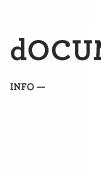Maria Muhle: Re-thinking past thought. Reenactment zwischen Kunst und Geschichte
The lecture presents a case study in the philosophy of media on the present forms of the reenactment: against the background of some of the central aspects of the discussion surrounding these forms, which are emerging within the charged relationship between historiography and the fine and performing arts, I would like to approach the philosophy of the reenactment as it is put forward by British philosopher Robin George Collingwood. For Collingwood, understanding history does not rest solely on the study of sources and the analysis of historical documents; much rather, it demands the re-thinking of past thoughts, which he describes as a reenactment in the sense of a staging of the ideal, that is of the meta-historical. In this vein, reenactment for Collingwood is not a specific method of historical knowledge, but much rather the consequence of historical imagination. The import of this for the thought of an historian is that it takes on a creative, constructive, and imaginative shape. To this I would like to subsequently ask in what way the interpretation of the reenactment can be excavated from its ontological dimension and placed within an aesthetic and political layer of meaning. The lecture comprises three parts: a first on documentarian reenactment, a second on the philosophy of reenactment, and a third part putting forward thoughts on an “aesthetic reenactment”. The seminar expands on the relation between history and thinking, and from there leads to Michel Foucault's archaeological method of appraising the historicity of thinking, against which Collingwood's understanding of history as repetition (reenactment) of thoughts (ideas) already thought. Additionally, the “power of historical imagination” broached by Collingwood in regards to the definition of fiction, as it is introduced by Jacques Rancière in his politico-aesthetic texts, is illuminated and its pertinence to that “excess of words” that Rancière delineates as a central aesthetic-political gesture in The Names of History is examined.
Under the direction of the German philosopher Christoph Menke and in collaboration with Chus Martínez, the seminar What is Thinking? Or a Taste that Hates Itself is a series of twelve two-part sessions focusing on the relationship between art and philosophy, between thinking and perceiving. It is an attempt to address the questions and the methods of philosophy for those who are curious but not necessarily close to the field. Each session is divided into a public lecture every Monday evening in the Ständehaus, followed by a more intimate discussion seminar on Tuesday mornings in the Zwehrenturm of the Fridericianum.
In September 1959, the philosopher Theodor W. Adorno gave a lecture on the occasion of documenta 2. A few days earlier, he had mentioned in a letter to Max Horkheimer his interest in visiting the exhibition, in seeing what culture—art—could do after the greatest collapse that the country and the world had ever experienced. This lecture, "The Idea of New Music” (Die Idee der neuen Musik), is of key significance to dOCUMENTA (13). It is read and commented upon by Albrecht Wellmer at the opening of the exhibition and by Carla Harryman at the end, as the inspiration and source for a reflection on the importance of deeds, like art, and thoughts, like philosophy, that are less driven by aims and results, than guided by values.
The What is Thinking? seminar is a rigorous meditation on language, on meaning, on the limits and possibilities of skepticism, on imagination as the ground for social democracy, and on art and experience. It aims to contribute to an understanding of the importance of an art exhibition with the history and tradition of documenta, as a crucial space for the community to respond to questions of ethical and aesthetic significance.
The seminar sessions can be attended individually or in full. Texts and other materials for the sessions are available online.
Maria Muhle is media theorist and a professor of aesthetic theory at the Merz Akademie Stuttgart. Her research focus is on political aesthetics with a focal point on aesthetic realism, bio politics and life, history and media. She is co-founder of the August Verlag Berlin, a forum for theory at the intersection of philosophy, art, and politics, and the author of: Biopolitische Konstellationen (2011).

















